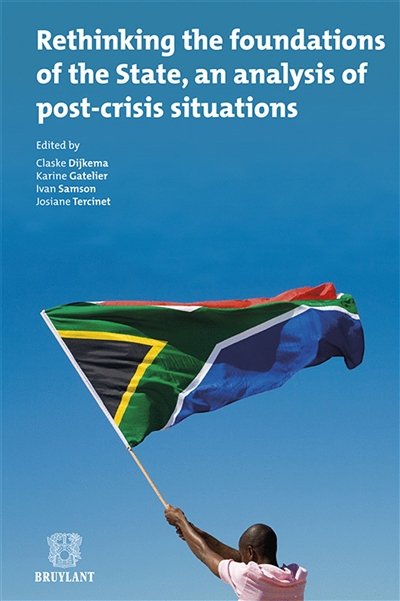en savoir plus

Carte fidélité
Permet à tous ses détenteurs d'obtenir 5% de réduction sur tous les livres lors du retrait en magasin (réduction non cumulable avec les réductions de type étudiant).
Offre également un certain nombre d'avantages auprès de nos partenaires.
Wishlist
Avec les favoris, retrouvez dans un espace les sélections effectuées au fur et à mesure de vos navigations dans le site.
Constituez pour votre usage personnel vos listes de livres en prévisions d'achats futurs et votre sélection d'articles, dossiers, événements, vidéos ou podcasts préférés ou à découvrir plus tard...
Il suffit simplement de cliquer sur "Ajout Favori" sur chaque page qui vous intéresse pour les retrouver ensuite dans votre espace personnel.
Requiert un compte Mollat
Mes Alertes
Requiert un compte Mollat
Rethinking the foundations of the State, an analysis of post-crisis situations
en savoir plus
Résumé
Ces contributions invitent à définir l'Etat en situation de post-crise lorsque différentes forces en présence telles que l'armée, des groupes religieux ou des chefs d'entreprise sont en position d'incarner le pouvoir. Les exemples aussi différents que la Russie, le Liban, le Kirghirzistan sont présentés. ©Electre 2025
Lire la Quatrième de couverture
Réduire la Quatrième de couverture
Rethinking the foundations of the State, an analysis of post-crisis situations
Consensus is growing that the application of the western model of the Nation-State in post-crisis contexts is problematic. Rather than on methods of State reform or State-building, the focus of this volume is on the model of the State and its transformation.
While international and national actors are undoubtedly the major players in State formation, they are not the only actors in this process. Local and regional actors at the sub-State level have received much less attention, but are central players in forming or re-forming governance structures. The authorities that take over when States fail, and ultimately collapse, include the conflicting parties such as military faction leaders ; remnants of the former State administration ; revitalized traditional authorities ; religious courts ; and local businessmen. These actors will continue or begin to exercise authority as « functional equivalents » of State structures, for example in the sectors of security and social services, and at times will aspire to replace the State.
Civil conflict fragments State power away from the centre and benefits private actors such as political, military, religious, social leaders on the basis of sub-national communities. At the regional or international levels the presence of cross-border identities (be it of an ethmic, religious, linguistic or other nature) may represent further competition for the State and can increase interference in State affairs, for example through military interference or diaspora support from outside State borders.
The concept of « transformation » is used rather than « reform » to describe the changes a post-crisis State goes through. The 'trans' in transformation implies that the form a State takes can go beyond the pre-existant State and that this is in many ways is an involuntary process.
This volume attempts to rethink the foundation of post-crisis States in four parts and an epilogue. The different authors deal with the rise of « parallel », « alternative » or « hybrid » systems that present an adaptation made in response to the prolonged absence of central government. This form of governance is driven by the evolving role of coalitions, business groups, traditional authorities, and civic groups. Moreover, one can observe new forms and new places of expression for citizenships and for the shaping of the political scene.
Fiche Technique
Paru le : 10/01/2012
Thématique : Droit international
Auteur(s) : Non précisé.
Éditeur(s) :
Bruylant
Collection(s) : Non précisé.
Contributeur(s) : Editeur scientifique (ou intellectuel) : Claske Dijskema - Editeur scientifique (ou intellectuel) : Karine Gatelier - Editeur scientifique (ou intellectuel) : Ivan Samson - Editeur scientifique (ou intellectuel) : Josiane Tercinet
Série(s) : Non précisé.
ISBN : 978-2-8027-3513-7
EAN13 : 9782802735137
Reliure : Broché
Pages : 442
Hauteur: 24.0 cm / Largeur 16.0 cm
Épaisseur: 2.4 cm
Poids: 622 g
